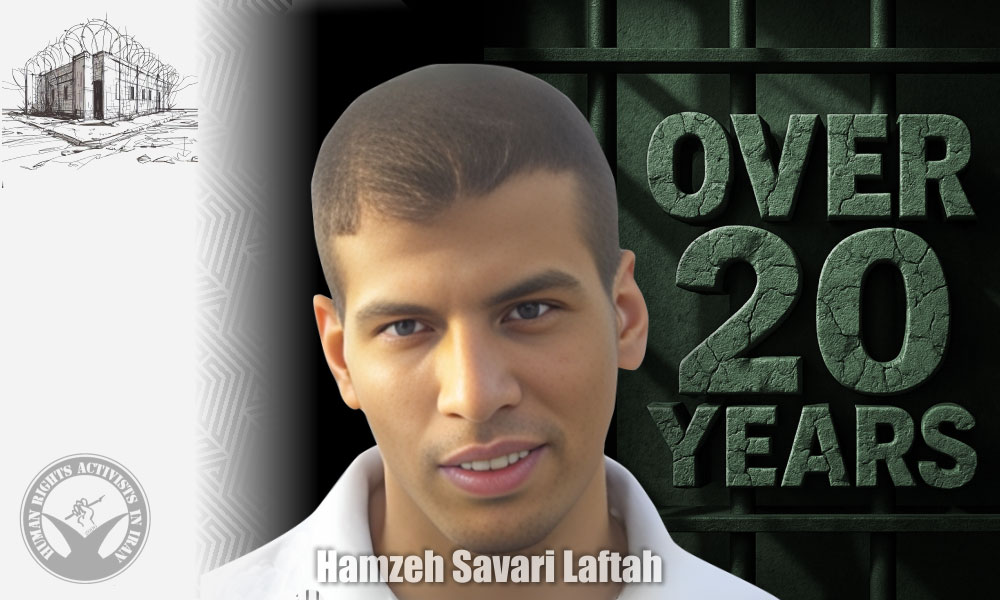HRANA – Many political and religious prisoners in Iran have endured over twenty years behind bars. To prevent their cases from fading from public memory in the flow of daily news, HRANA has launched a series of reports highlighting their situations. Each installment outlines the prisoner’s legal case, detention conditions, access to rights, and immediate needs.
In this installment, HRANA, the news agency of Human Rights Activists in Iran, examines the latest status of Abdul-Zahra Halichi (Haliji) after more than two decades of imprisonment.
Case Information
• Name: Abdul-Zahra Halichi (Haliji)
• Year of arrest: 2005
• Charges: “Acting against national security, moharebeh (enmity against God), and efsad-e fel-arz (corruption on earth)”
• Initial sentence: Life imprisonment
• Current sentence: Life imprisonment
• Places of detention: Served his sentence in Karun Prison, Ahvaz; currently held in Ward 5 of Sheiban Prison, Ahvaz.
• Leave / access: No prison leave reported in recent years; limited access to family and lawyer.
• Current status: Still serving a life sentence despite legal changes that could allow for review or commutation.
Case Background and Judicial Process
In 2005, Abdul-Zahra Halichi was arrested by security forces. Shortly thereafter, Branch 1 of the Revolutionary Court of Ahvaz convicted him of “acting against national security, moharebeh, and corruption on earth,” sentencing him to life imprisonment. This verdict placed him among those serving indefinite terms, effectively extending incarceration for decades and severely limiting access to judicial review.
Key points in the process:
• Heavy security charges: The charge of moharebeh is among the most severe in Iran’s political-security cases and typically carries wide-ranging judicial and executive consequences.
• Continued imprisonment despite legal reforms: Although legislative changes allow for retrial, sentence reduction, or parole in some cases, Halichi remains incarcerated.
Conditions of Detention and Transfers
Throughout his imprisonment, Halichi has been held in Karun and Sheiban prisons in Ahvaz. He spent several years in Karun Prison following his sentencing.
• Feb 2019: Reports of beatings in Sheiban Prison.
• Apr 2020: Subjected to torture after being transferred to The Ministry of Intelligence’s detention facility in Ahvaz.
• Apr 2024: Reported beatings by prison guards and intelligence protection officers in Ward 5 of Sheiban Prison.
• Dec 2024: Threatened with solitary confinement or exile to remote areas after protesting authorities’ failure to enforce the principle of separation of crimes.
Since then, he has remained imprisoned in Sheiban.
Observations on Detention Standards
• Frequent transfers: Repeated relocations between wards and prisons disrupt access to family, lawyers, and medical care.
• Violence in custody: Multiple reports of beatings (2019, 2020, 2024) highlight the need for independent documentation and legal follow-up.
• Denial of medical care: Despite suffering from right leg infections, knee pain, and requiring urgent surgery to remove a metal rod from his leg, Halichi has been systematically denied hospital transfer and specialized treatment. Denying prisoners access to healthcare constitutes inhuman treatment and a violation of the right to health and even the right to life, often used as a tool of further pressure and repression.
Access to Family, Lawyer, and Leave
In recent years, Halichi has not been granted leave, and his access to family and legal counsel has been restricted. Such limitations not only have psychological and social consequences but also undermine his ability to mount an effective legal defense or pursue retrial procedures.
Potential Legal Avenues (General Recommendations)
1. Retrial: Assessing new evidence or procedural flaws.
2. Sentence reduction or commutation: If legal grounds are met.
3. Conditional release or suspension: Based on time served, good conduct, or health conditions.
4. Addressing rights violations in custody: Including access to treatment, protection from violence, regular visitation rights, and legal access.
International documentation and advocacy: Utilizing UN reporting mechanisms when domestic avenues are blocked.
Timeline (Summary)
• 2005: Arrested; charged with “acting against national security, moharebeh, and corruption on earth.”
• Initial verdict: Life imprisonment.
• Following years: Held in Karun Prison, Ahvaz.
• Feb 2019: Reported beating in Sheiban Prison.
• Apr 2020: Tortured in The Ministry of Intelligence’s detention facility, Ahvaz.
• Apr 2024: Beaten by prison guards and intelligence officers in Sheiban Prison.
• Dec 2024: Threatened with solitary confinement or exile after protesting non-segregation of prisoners.
• Recent years: No leave granted; deprived of adequate medical care; limited access to family and lawyer.
• Current status: Continues to serve life imprisonment despite potential eligibility for legal review.
Conclusion and Need for Review
Despite legal reforms enabling retrial, sentence reduction, or release in moharebeh cases, Halichi remains behind bars. His case exemplifies long-term political-security imprisonment in Iran, underscoring the urgent need for review mechanisms.
Halichi’s situation highlights both the systematic denial of fundamental rights in detention (such as visitation, legal access, and healthcare) and the importance of using all available domestic and international legal avenues to reduce sentences and secure freedom.
Urgent Needs
• Regular, unrestricted access to lawyer and family.
• Independent medical evaluation following allegations of torture and long-term health issues.
• Review of eligibility for retrial or other mechanisms to reduce/terminate his sentence under current law.
• Enforcement of prison regulations regarding visitation, calls, and leave.
• Access to appropriate medical care and treatment.
About this Series
This report is part of the “Two Decades Behind Bars” series, which aims to document the cases of long-term prisoners and to highlight the collective responsibility to ensure their visibility and pursue their rights.





